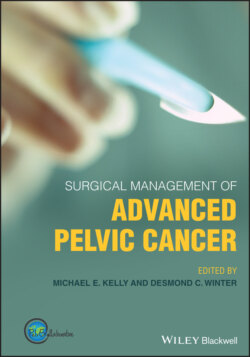Читать книгу Surgical Management of Advanced Pelvic Cancer - Группа авторов - Страница 51
Locally Recurrent Rectal Cancer
ОглавлениеThe incidence of locally recurrent rectal cancer (LRRC) remains approximately 5%. A negative resection margin, the most important predictor of outcome, may be difficult to achieve due to the anatomical location, involvement of surrounding structures, and the challenges of prior surgery. As a result, upfront chemoradiotherapy may downstage tumors and improve resectability. In patients who have received radiotherapy for treatment of their primary tumor, reirradiation options are limited. Induction chemotherapy has been proposed as a potential means of improving tumor downstaging and clear margin rates. Moreover, it may eradicate occult micrometastases. Development of metastatic disease is common following local recurrence and represents the leading cause of cancer‐related death following successful treatment of local recurrence. Preliminary results of a cohort study in the Netherlands demonstrated R0 and pCR rates of 55 and 17% respectively with induction chemotherapy compared to 49 and 4% with CRT alone (p = 0.506 and p = 0.015 respectively) [57, 74]. Among the induction chemotherapy group, achieving a pCR was strongly associated with improved three‐year DFS (both local recurrence and distant metastases). Two European prospective randomized trials, the French GRECCAR15 and the Dutch PelvEx2 Induction Chemotherapy Trial, aim to determine the optimum preoperative management for LRRC (NCT03879109, Dutch Cancer Society no. 12960/2020–1). GRECCAR15 is comparing induction FOLFIRINOX (six cycles) followed by CRT (30.2 Gy with capecitabine) to induction FOLFIRINOX alone. The primary outcome of interest is the R0 resection rate.
